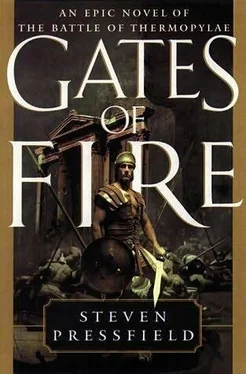Steven Pressfield - Gates of Fire - An Epic Novel of the Battle of Thermopylae
Здесь есть возможность читать онлайн «Steven Pressfield - Gates of Fire - An Epic Novel of the Battle of Thermopylae» весь текст электронной книги совершенно бесплатно (целиком полную версию без сокращений). В некоторых случаях можно слушать аудио, скачать через торрент в формате fb2 и присутствует краткое содержание. Жанр: Историческая проза, на английском языке. Описание произведения, (предисловие) а так же отзывы посетителей доступны на портале библиотеки ЛибКат.
- Название:Gates of Fire: An Epic Novel of the Battle of Thermopylae
- Автор:
- Жанр:
- Год:неизвестен
- ISBN:нет данных
- Рейтинг книги:3 / 5. Голосов: 1
-
Избранное:Добавить в избранное
- Отзывы:
-
Ваша оценка:
- 60
- 1
- 2
- 3
- 4
- 5
Gates of Fire: An Epic Novel of the Battle of Thermopylae: краткое содержание, описание и аннотация
Предлагаем к чтению аннотацию, описание, краткое содержание или предисловие (зависит от того, что написал сам автор книги «Gates of Fire: An Epic Novel of the Battle of Thermopylae»). Если вы не нашли необходимую информацию о книге — напишите в комментариях, мы постараемся отыскать её.
Gates of Fire: An Epic Novel of the Battle of Thermopylae — читать онлайн бесплатно полную книгу (весь текст) целиком
Ниже представлен текст книги, разбитый по страницам. Система сохранения места последней прочитанной страницы, позволяет с удобством читать онлайн бесплатно книгу «Gates of Fire: An Epic Novel of the Battle of Thermopylae», без необходимости каждый раз заново искать на чём Вы остановились. Поставьте закладку, и сможете в любой момент перейти на страницу, на которой закончили чтение.
Интервал:
Закладка:
Fortunately God in his mercy has provided a counterpoise to our species' innate depravity. That gift, my young friend, is war. War, not peace, produces virtue. War, not peace, purges vice.
War, and preparation for war, call forth all that is noble and honorable in a man. It unites him with his brothers and binds them in selfless love, eradicating in the crucible of necessity all which is base and ignoble. There in the holy mill of murder the meanest of men may seek and find that part of himself, concealed beneath the corrupt, which shines forth brilliant and virtuous, worthy of honor before the gods. Do not despise war, my young friend, nor delude yourself that mercy and compassion are virtues superior to andreia, to manly valor. He finished, turning to Medon and the elders. Forgive me for waxing long-winded.
The harrowing ended; the Peers dispersed. Outside beneath the oaks, Dienekes sought out Polynikes, addressing him by his praise-name Kallistos, which may be defined as harmoniously beautiful or of perfect symmetry, though in the tone Dienekes employed, it expressed itself in the converse, as pretty boy or angel face.
Why do you hate this youth so much? Dienekes demanded.
The runner replied without hesitation. Because he does not love glory.
And is love of glory the supreme virtue of a man?
Of a warrior.
And of a racehorse and a hunting dog.
It is the virtue of the gods, which they command us to emulate.
The others of the mess could overhear this exchange, though they affected not to, since, under the laws of Lykurgus, no matter discussed behind those doors may be carried over to these more public precincts. Dienekes, realizing this as well, brought himself under control and faced the Olympian Polynikes with an expression of wry amusement.
My wish for you, Kallistos, is that you survive as many battles in the flesh as you have already fought in your imagination. Perhaps then you will acquire the humility of a man and bear yourself no longer as the demigod you presume yourself to be.
Spare your concern for me, Dienekes, and save it for your boy friend. He has greater need of it.
That hour had arrived when the messes along the Amyklaian Way released their men, those over thirty to depart for their homes and wives, and the younger men, of the first five age-classes, to retire under arms to the porticoes of the public buildings, there to stand the night watches over the city or curl in their cloaks for sleep. Dienekes took these last moments to speak apart with Alexandros.
The man placed an arm about the boy's shoulder; they moved slowly together beneath the unlit oaks. You know, Dienekes said, that Polynikes would give his life for you in battle. If you fell wounded, his shield would preserve you, his spear would bring you safely back. And if death's blow did find you, he would swim without hesitation into the manslaughter and spend his last breath to retrieve your body and keep the enemy from stripping your armor. His words may be cruel, Alexandros, but you have seen war now and you know it is a hundred times crueler.
Tonight was a lark. It was practice. Prepare your mind to endure its like again and again, until it is nothing to you, until you can laugh in Polynikes' face and return his insults with a carefree heart.
Remember that boys of Lakedaemon have endured these harrowings for hundreds of years. We spend tears now that we may conserve blood later. Polynikes was not seeking to harm you tonight. He was trying to teach that discipline of mind which will block out fear when the trumpets sound and the battle pipers mark the beat.
Remember what I told you about the house with many rooms. There are rooms we must not enter. Anger. Fear. Any passion which leads the mind toward that 'possession' which undoes men in war. Habit will be your champion. When you train the mind to think one way and one way only, when you refuse to allow it to think in another, that will produce great strength in battle.
They stopped beneath an oak and sat.
Did I ever tell you about the goose we had on my father's kleros? This bird had formed a habit, God knows why, of pecking three times at a certain patch of turf before she waddled into the water with her brothers and sisters. When I was a boy, I used to marvel at this. The goose did it every time. It was compelled to.
One day I got it into my head to prevent her. Just to see what she would do. I took up a station on that patch of superstitious turf-I was no more than four or five years old at the time-and refused to let that goose come near it. She became frantic. She rushed at me and beat me with her wings, pecking me bloody. I fled like a rat. At once the goose recovered composure. She pecked her little spot of turf three times and slid into the water, contented as could be.
The older Peers were departing now for their homes, the younger men and boys returning to their stations.
Habit is a mighty ally, my young friend. The habit of fear and anger, or the habit of selfcomposure and courage. He rapped the boy warmly upon the shoulder; they both stood.
Go now. Get some sleep. I promise you, before you see battle again, we'll arm you with all the handiest habits.
Chapter Thirteen
When the youths began dispersing to their stations, Dienekes with his squire, Suicide, moved out to the road, joining a company of other officers assembling to proceed to the ekklesia, where they were to assist in the organization of the coming funeral games. A helot boy approached Dienekes there, before the mess, dashing up with a message. I was on the point of departing with Alexandros for the open porches around the Square of Freedom to take up my berth for the night when a sharp whistle summoned me.
To my astonishment it was Dienekes.
I crossed to him swiftly, presenting myself respectfully upon his left, his shield side. Are you acquainted with the location of my house? he asked. These were the first words he had ever addressed directly to me. I replied that I was. Go there now. This boy will lead you.
Dienekes said nothing more but turned and departed at once with the body of officers toward the Assembly. I had no idea what was required of me. I asked the boy if perhaps there was some mistake, was he sure it was I who was required? It's you, all right, and we'd better make the pebbles fly.
The town house of Dienekes' family, in contradistinction to the farmstead their helot families worked three miles south along the Eurotas, stood two lanes off the Eventide Road, on the west end of the village of Pitana. It was not conjoined to other dwellings, as many in that quarter were, but isolated at the edge of a grove beneath ancient oaks and olives. It had itself been a farmhouse at some point in the past and possessed yet the unadorned utilitarian charm of a country kleros.
The house itself was unassuming in the extreme, barely larger than a cottage, less prepossessing even than the house of my own father in Astakos, though its courtyard and grounds, nestled within a grove of myrtle and hyacinth, arose like a haven of refuge and charm. One arrived upon the site at the terminus of a series of flower-girt lanes, each seeming to draw one deeper into a space of serenity and seclusion, passing, as one went, the dappled clusters of other Peers' cottages, their hearths aglow in the evening chill, with the peal of children's laughter and the happy yapping of their hounds spilling over the founded walls. The site itself, and its bowered environs, could not have appeared farther removed from the precincts of training and of war, nor offered more contrast and comfort to those repairing from them.
Dienekes' eldest daughter, Eleiria, who was eleven at the time, let me in the gate. I perceived low white walls surrounding an immaculately swept courtyard of plain tile brick, decorated with flowers in earthen pots upon the sill, jasmine bloomed along the unvarnished beams of an axehewn pergola; wisteria and oleander nestled trim upon the face; a stonework watercourse, no wider than a handbreadth, gurgled along the northern wall. A servant girl whom I did not recognize waited beside a plaited wicker garden seat in the shadows.
Читать дальшеИнтервал:
Закладка:
Похожие книги на «Gates of Fire: An Epic Novel of the Battle of Thermopylae»
Представляем Вашему вниманию похожие книги на «Gates of Fire: An Epic Novel of the Battle of Thermopylae» списком для выбора. Мы отобрали схожую по названию и смыслу литературу в надежде предоставить читателям больше вариантов отыскать новые, интересные, ещё непрочитанные произведения.
Обсуждение, отзывы о книге «Gates of Fire: An Epic Novel of the Battle of Thermopylae» и просто собственные мнения читателей. Оставьте ваши комментарии, напишите, что Вы думаете о произведении, его смысле или главных героях. Укажите что конкретно понравилось, а что нет, и почему Вы так считаете.












